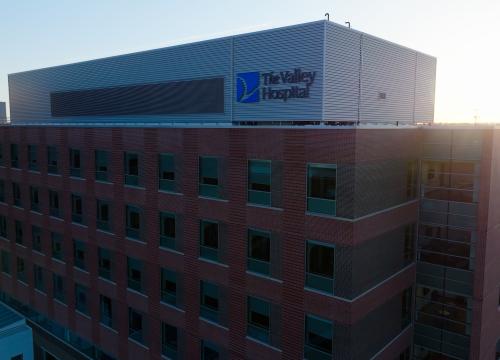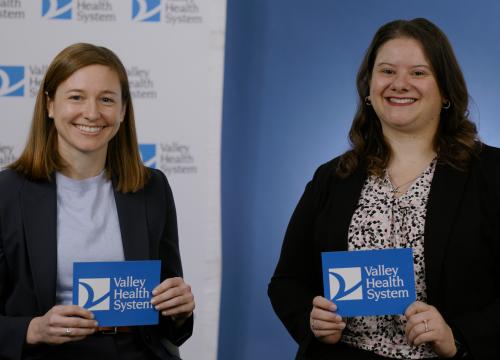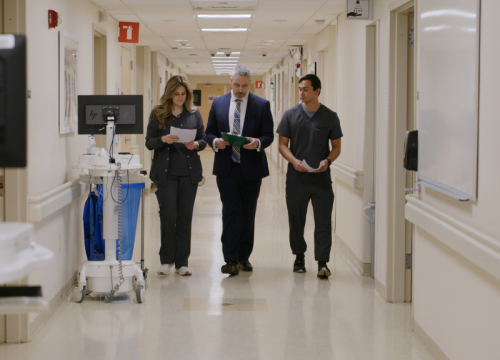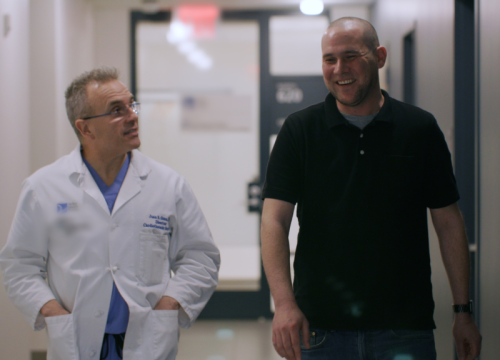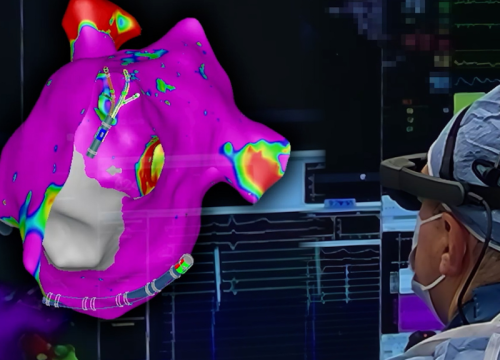If you’ve been diagnosed with pancreatic cancer, you’ll have a team of gastrointestinal cancer specialists at Valley focused on your care.
We provide the latest treatment options, including minimally invasive surgery, the Whipple procedure, chemotherapy, immunotherapy and precision radiation therapy. We also offer clinical trials. All the compassionate, personal touch you expect from Valley.
With Valley-Mount Sinai Comprehensive Cancer Care, providers from Valley and Mount Sinai combine their shared expertise and knowledge. Together, they’ll offer you the most advanced pancreatic cancer care, right here in northern New Jersey.
Pancreatic Cancer Symptoms
Early on, pancreatic cancer may not cause any symptoms. As the disease progresses, you may notice these signs of pancreatic cancer:
- New abdominal and/or middle back pain
- Change in urine and stool appearance (dark urine and pale stools)
- Fatigue
- Yellowing skin or eyes (jaundice)
- Loss of appetite, a “full feeling”
- Nausea and vomiting
- Unexplained weight loss
Because these symptoms can also indicate much less serious conditions, see your primary care physician if you experience any of them.
Like most cancers, the earlier you detect pancreatic cancer and start treatment, the more effective treatment can be.
Risk Factors for Pancreatic Cancer
The following increase your risk for pancreatic cancer:
- Smoking (the biggest risk factor)
- Family history of pancreatic cancer
- Genetic syndromes
- Chronic pancreatitis
- Diabetes, especially new onset
- Obesity
- High-fat diet
- Excessive alcohol consumption (more than three drinks per day)
Valley offers pancreatic cancer risk assessment. This includes genetic consultation and advanced diagnostics, like endoscopic ultrasound, noninvasive biopsy and endoscopic retrograde cholangiopancreatography (ERCP).
Types of Pancreatic Cancer
There are different types of pancreatic cancer — and they each respond to treatment differently. We’ll start with imaging. And if we see something suspicious, we’ll do a biopsy. This all helps us determine what type of pancreatic cancer you have.
From there, will work with you on a treatment plan tailored specifically to the type of pancreatic cancer you have.
These are the two main types of pancreatic cancer:
- Exocrine pancreatic cancer: Most pancreatic cancers are exocrine tumors. The most common type is an adenocarcinoma.
- Pancreatic neuroendocrine tumors: This is a rarer type of pancreatic cancer. These tumors tend to grow more slowly than exocrine tumors.
A Team Approach to Pancreatic Cancer Care
Almost all people who have pancreatic cancer will need several different treatments, which may include surgery, chemotherapy and radiation therapy. We also offer clinical trials.
Your care team will coordinate every step of your care — working together to ensure each treatment is as effective as possible.
Your pancreatic cancer team may include:
- Medical oncologists
- Radiation oncologists
- Surgical oncologists
- Gastroenterologists
- Interventional radiologists
- Diagnostic radiologists
- Genetic counselors
Your team may also include patient navigators, social workers, palliative care providers, pain management specialists and dietitians.
Pancreatic Cancer Treatment at Valley
Your treatment will depend on a variety of factors, including the stage of your cancer and your overall health.
Genetic Testing and Molecular Profiling
To ensure that we are personalizing your care for pancreatic cancer, we recommend genetic and genomic testing.
- Genetic counseling and testing: Valley offers genetic testing and counseling to anyone diagnosed with pancreatic cancer. BRCA1 and BRCA2 are the most common causes of inherited pancreatic cancer. This information is not only important for your family members; it can also help guide your treatment. If you have a BRCA mutation, there are certain targeted treatments that are effective.
- Molecular profiling: We may do genomic and molecular tumor testing to help us identify genes and mutations in your tumor. These mutations help predict how the cancer will behave — and how it will react to treatments. We use this information to help you and your care team make decisions about your treatment plan.
Pancreatic Cancer Surgery at Valley
Surgery is the first consideration for most patients with pancreas cancer. Removing the cancer surgically is currently the only option for potentially curing pancreatic cancer.
Additionally, surgery is often part of combination treatment plans with chemotherapy and/or radiation therapy.
- When you have surgery: Depending on the stage and location of the cancer, you may have surgery either before or after chemotherapy and radiation.
- Robotic surgery: At Valley, we specialize in minimally invasive, robotic surgery for pancreatic cancer. We use this specifically for tumors located in the thin part (tail) of the pancreas, with a procedure called a distal pancreatectomy. This approach is frequently recommended for pancreatic neuroendocrine cancer.
Robotic procedures offer patients a faster recovery, less pain after surgery, fewer days in the hospital and a prompt return to chemotherapy.
- Whipple procedure: Valley surgeons specialize in the Whipple procedure (also known as a pancreaticoduodenectomy). This complex surgery involves removing the gallbladder, bile duct, part of the small intestine and head of the pancreas.
- If surgery is not an option: Depending on the stage of the tumor and patients’ overall health, surgery isn’t always an option. We’ll explore your options with you and develop a plan that’s right for you. That may include treatments, such as chemotherapy, immunotherapy, radiation, targeted treatments or palliative care.
Medical Therapy and Radiation Therapy for Pancreatic Cancer
You may receive chemotherapy treatments, often combined with radiation therapy, at different stages of your treatment.
Your care team factors in the stage of the cancer, the results of your genomic testing and your overall health to determine the best treatments for you.
- Before surgery (neoadjuvant chemotherapy): Your treatment plan may include chemotherapy and radiation therapy before pancreatic cancer surgery. These treatments may shrink the tumor to make it easier to remove and improve your outcome.
- After surgery: Research has shown that chemotherapy after pancreatic cancer surgery improves survival. Our surgical oncologists, medical oncologists and radiation oncologists at Valley work together to ensure that you begin your chemotherapy and radiation treatments as quickly as possible after surgery.
- Without surgery: Some advanced pancreatic cancers — particularly those that have spread to other parts of the body — cannot be treated surgically. In those cases, chemotherapy and radiation therapy can help shrink the tumor, decrease pain and ease other symptoms associated with pancreatic cancer.
Why Choose Valley for Pancreatic Care?
- Advanced therapies: Our medical oncologists specialize in providing precision medicine to find the right therapies — including chemotherapy and targeted therapies — for your specific needs. We also offer clinical trials that provide options for pancreatic cancer not widely available.
- Surgical expertise: Valley has extensive experience with pancreatic surgery, including the Whipple procedure and minimally invasive robotic surgeries. Our surgical oncologists perform more than half of our pancreatic surgeries using the da Vinci Surgical System.
- A focus on quality of life: Pancreatic cancer and treatment can affect your quality of life. Throughout your treatment, your care team will work closely with our pain management specialists and palliative care providers. They will work with you to address symptoms, including pain, nausea, pancreatitis and other gastrointestinal conditions associated with pancreatic cancer and treatment.
- Expertise in pancreatic cysts: If an imaging test reveals that you have a pancreatic cyst, experts at Valley can help guide you through the next steps. Most of the time, a pancreatic cyst is not pancreatic cancer. Our team will work with you to understand your pancreatic cyst options and develop a treatment plan to address it.
- Combined expertise: At Valley-Mount Sinai Comprehensive Cancer Care, providers from Valley and Mount Sinai have a weekly conference together to discuss pancreatic cancer patients’ treatment plans. This combined expertise offers you the highest quality pancreatic cancer care right in your own community.










